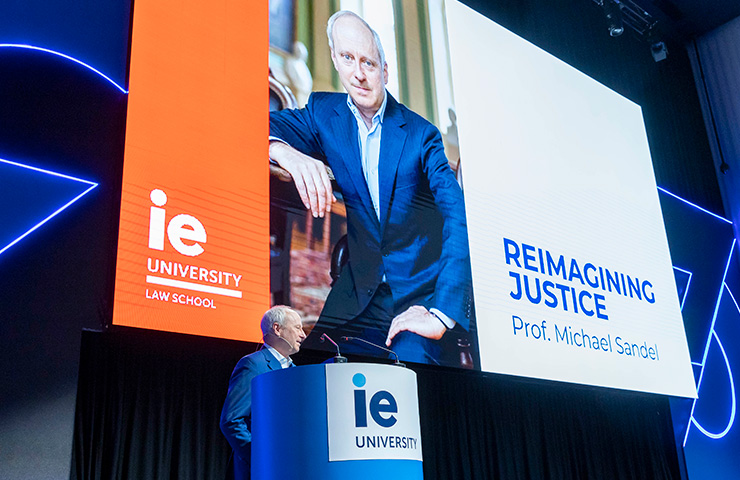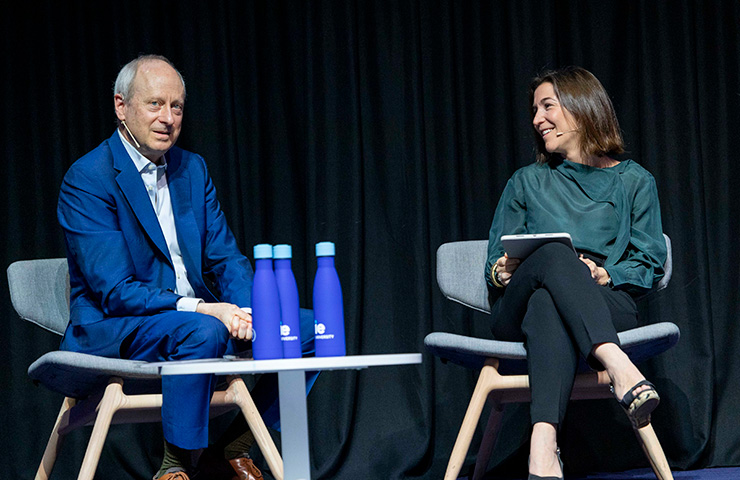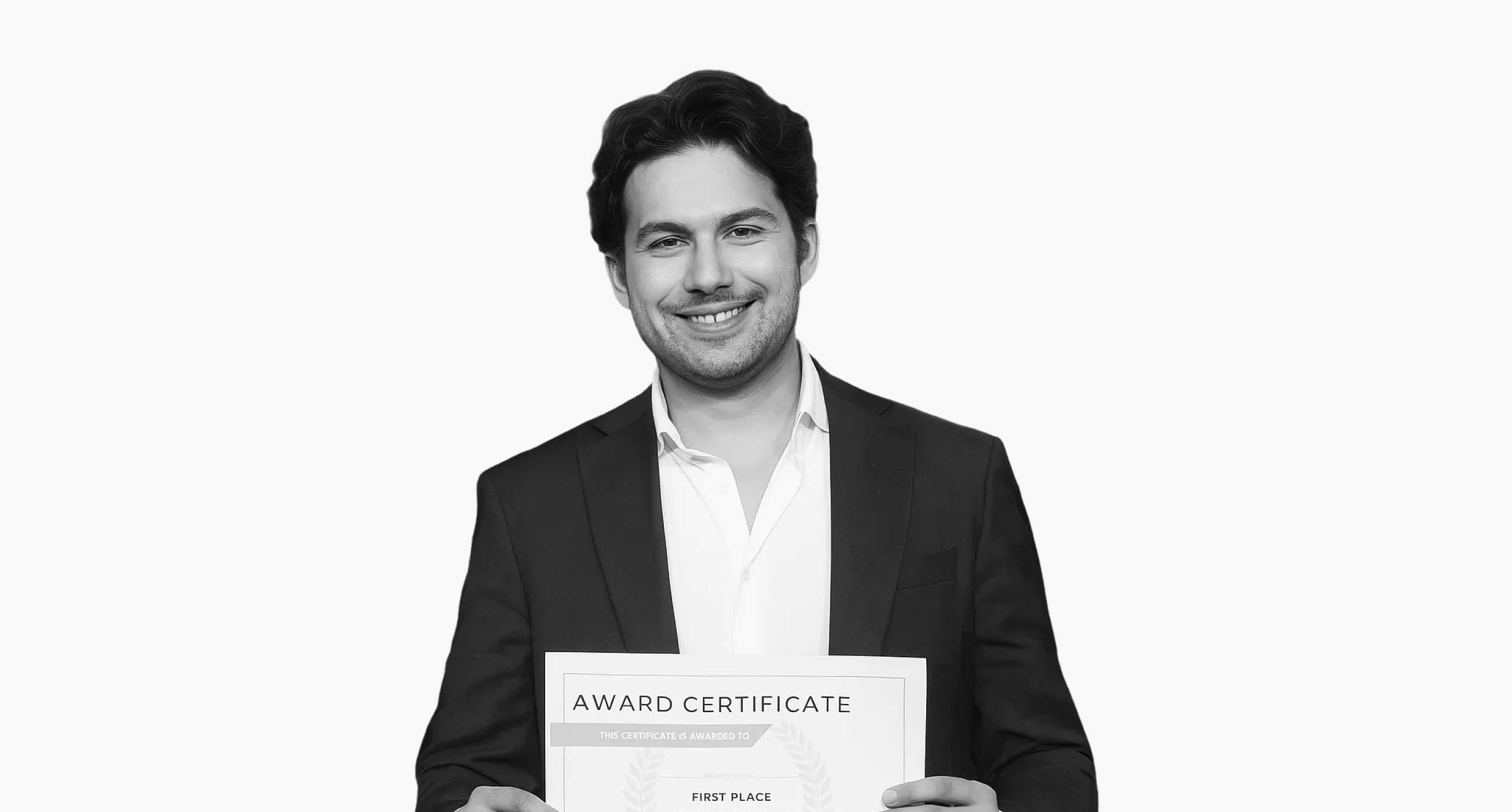With his engaging and commanding presence, Professor Sandel spotlighted philosophical questions that both citizens and lawyers face, igniting debates among audience members about the nature of a just society.
What does a just society look like, and what do we owe one another as a society at large? These were some of the questions political philosopher and Harvard Law School Professor Michael Sandel covered in his discussion with students during his guest appearance at IE Law School. Pointing out that students attend law school not only to learn what the law requires but also to understand what creates a just society, Michael went on to explain, “We need to figure out how to organize our society so people can debate and deliberate about hard ethical questions, including justice.”
As a political philosopher, author and professor at Harvard Law School, Professor Sandel is one of the most esteemed voices in moral philosophy. He was honored with the 2018 Princess of Asturias Award for Social Sciences and is described as “the most relevant living philosopher, a rockstar moralist and currently the most popular professor in the world.” His writings have been published in over 27 languages.
Justice has been a subject society has grappled with for centuries, with philosophers like Aristotle striving to define its essence. Professor Sandel noted that according to Aristotle, justice involves giving people what they deserve. “It’s a simple principle until you notice that who deserves what and why is very controversial, deeply controversial,” he emphasized. In order to tackle this question, we must establish what is worth valuing and what deservedness truly means.
Continuing his exploration of justice and deservedness, Michael discussed the concept of meritocracy—a society governed by merit-based selection. Such a society believes that valuable resources like income, wealth, power, prestige and opportunities should not be distributed based on birth, nepotism or corruption. Instead, everyone should theoretically start from the same point, and their efforts, talents and hard work should determine the winners and beneficiaries of success.
However, is meritocracy the best and most accurate principle to govern a just society? Michael initiated a discussion on this topic by asking attendees to think about their favorite high school teacher. He then highlighted the stark contrast between their earnings and those of Cristiano Ronaldo, who earns $200 million per year—2000 times more than the average high school teacher in Spain. The professor then posed the question to the audience: “Does Ronaldo deserve to earn 2000 times more than your favorite high school teacher? Does his contribution to society as a football player hold 2000 times more value than that of Nadia’s high school teacher?”
Defining a just society, together
Professor Sandel then shifted the conversation to society’s values and how they are reflected. Asking attendees, “Do we truly have the authority to influence where others place value in society?”
IE Law School students demonstrated their reasoning abilities when prompted to consider a race where both runners had equal opportunity and practice. Professor Sandel used esteemed runner Usain Bolt as an example, asking if any student would deny that the winner deserves the race winnings, even with fair equality of opportunity. Audience member Louisa challenged this belief, arguing that genetics play a role—a taller man with longer legs and more stamina would likely win against other individuals, even with controlled factors such as practice time.
Louisa was challenged by another student, Lu, who argued that “Even if all racers had an equal standpoint, the choice to put more or less effort is dependent on variables such as where they grew up and how their values were influenced in childhood. Because we can´t control all factors, the winner deserves to win.”
Michael introduced another factor into the discussion: the idea that when you work for something, it is fair to receive something in return.

He mentioned that according to Usain Bolt, his training partner, Yohan Blake, works harder than Bolt himself. The next question posed to the audience was: “If effort is the basis of deservedness and Usain Bolt didn’t practice that hard, does he still deserve the winnings?”
Student Jacob Dane responded that he agrees that Usain is deserving, but there is no singular definition of what someone deserves. “As long as you give the equal playing field, I do think it deserves the rewards that flow with it.” When further prodded by Michael, he conceded, “I feel like deserve is a hard word. I think he is entitled to the winnings. Does he deserve the winnings? Maybe not so much.”
A justice-oriented law school
With IE Law School’s strong connections to renowned professionals, universities and academics, intriguing conversations like these continue to unfold. The school’s dean Soledad Atienza explains, “We offer a holistic academic experience to our students. And, above all, we educate in values and principles.” IE Law School is relentlessly working toward being a justice-oriented law school, with a strong focus on human rights, “For any law school, justice is the greatest value,” notes Soledad, and Professor Sandel’s visit is a powerful step in that direction.
IE Law School Master of Laws (LL.M.) student Jacob Dane explains, “The Sandel event was incredibly illuminating. For me, it felt like the perfect bridge between the humanities, specifically philosophy, and law. It felt real as if all of the past courses and years of learning culminated into an event where we could see the intersection between philosophy and law flourish, and I am so grateful to have been able to speak with Professor Sandel.”

The stimulating conversations that unfolded throughout the event saw Professor Sandel igniting high-caliber discussions among IE Law School students.
As the discussion drew to a close, he was careful to shed light on one of the dark sides of the meritocratic ideal. “It can reinforce pride, arrogance or hubris in citizens who believe their success is solely their own doing, and it can reinforce a sense in those left behind that ‘my failure must be my fault,'” he observed. “What’s at stake in the debates about meritocracy and justice isn’t just what makes a just society, but what makes a good society.”
Commenting on the progress IE Law School is making as a justice-oriented institution, Sandel said “I can see you’re already doing very well, [cultivating] the ability of students to reason together in public about hard, ethical and civic questions related to justice and law.” He went on to reveal that he was struck by the students’ instincts to listen for the principle behind the questions, declaring, “that ability is a rare and important art for Democratic Society, so if you can cultivate that capacity, IE Law School will continue to make a great contribution to the future of civic life.”
Ready to help shape society with human rights and justice at the core?
IE Law School continues to train the future of the legal world.






